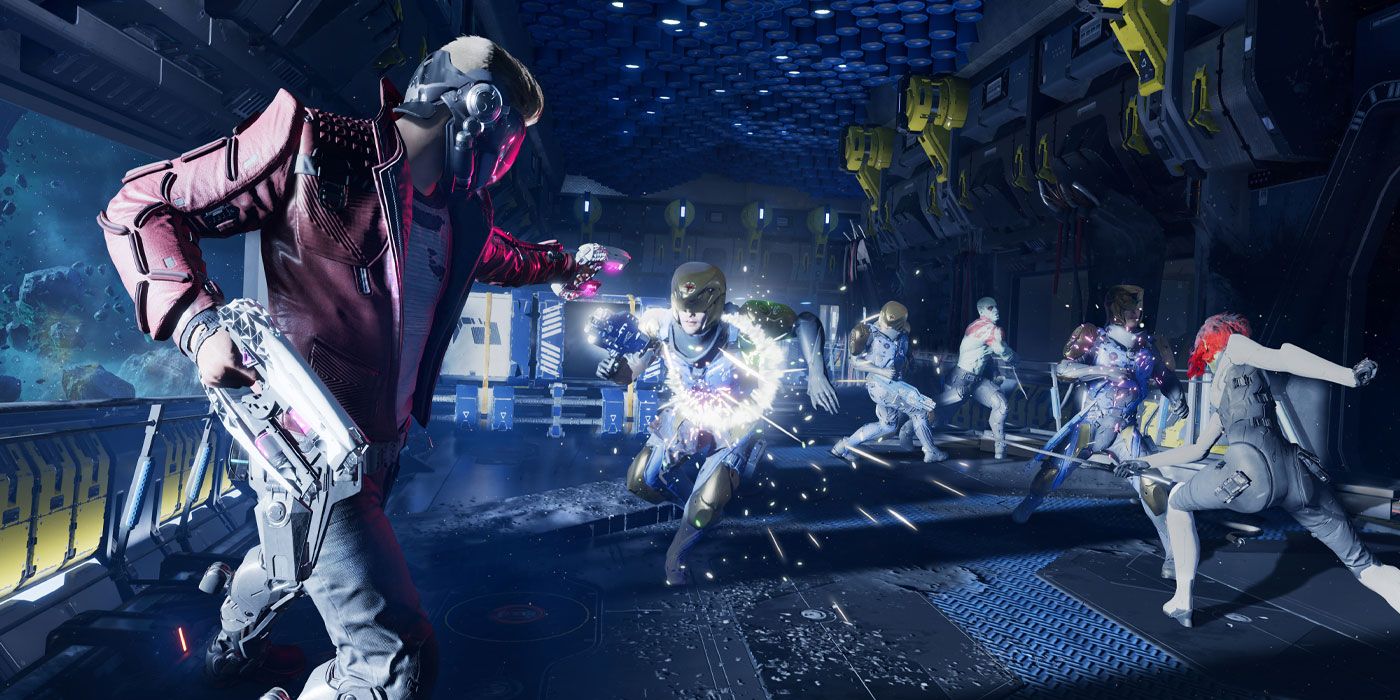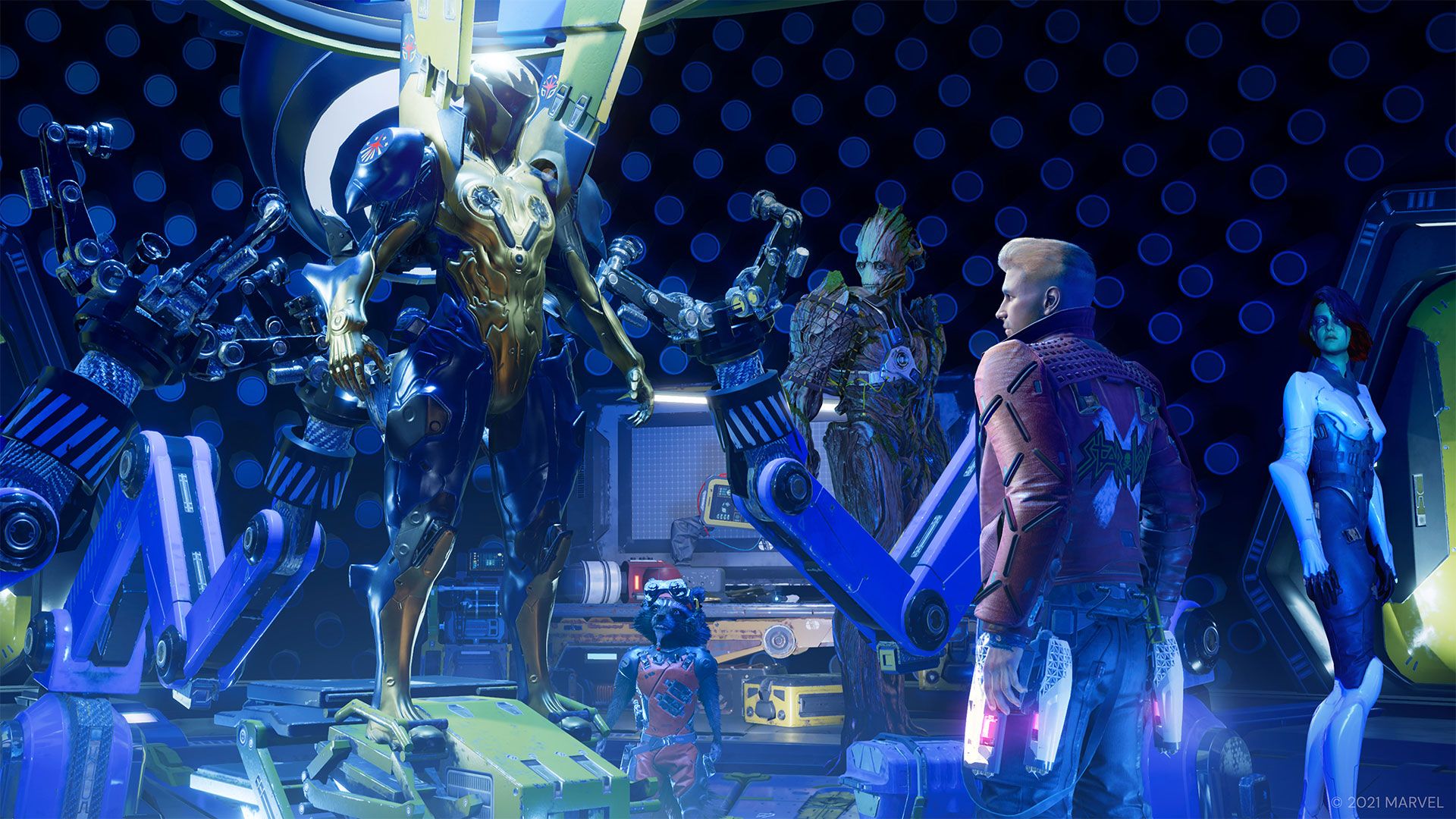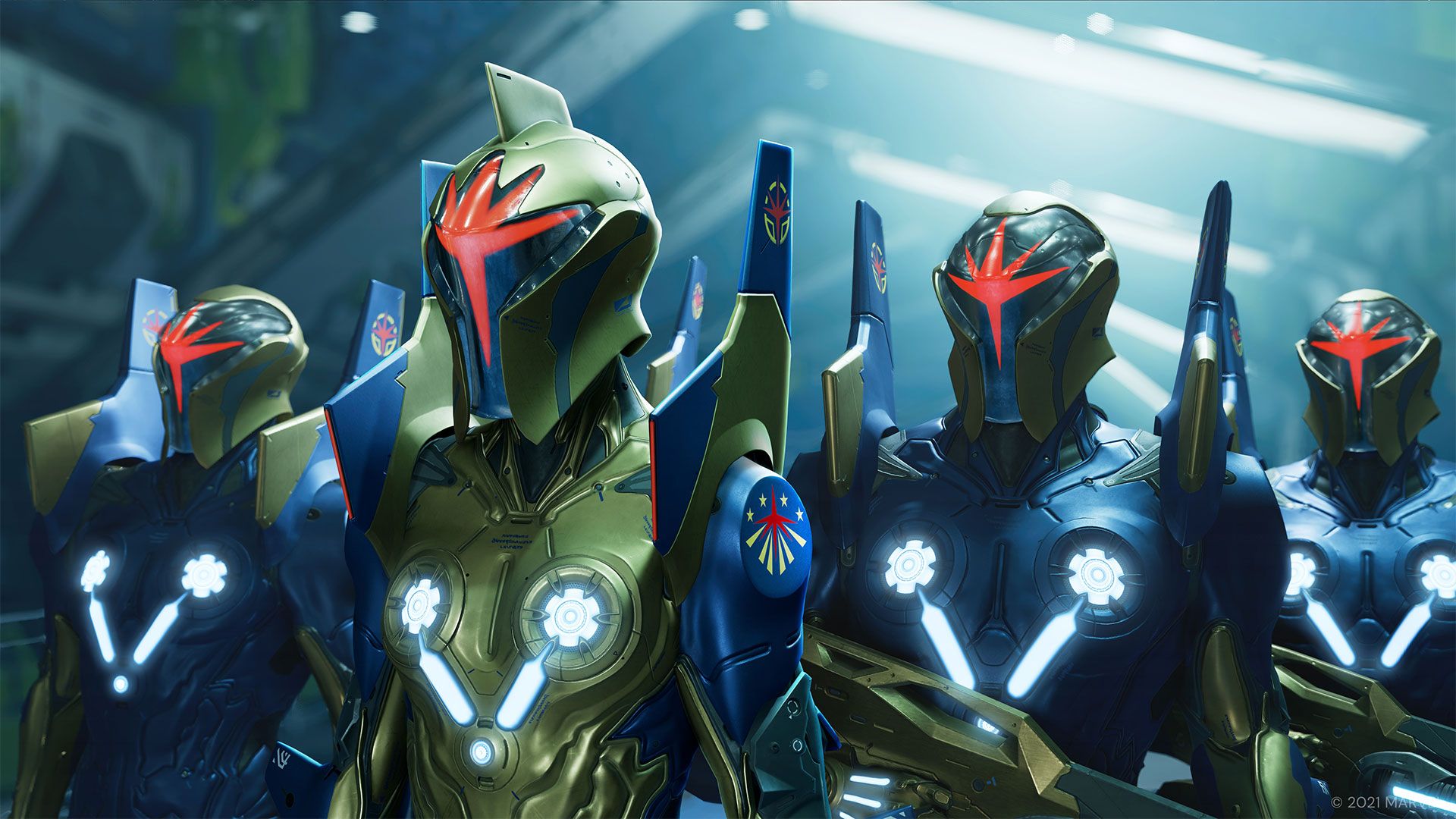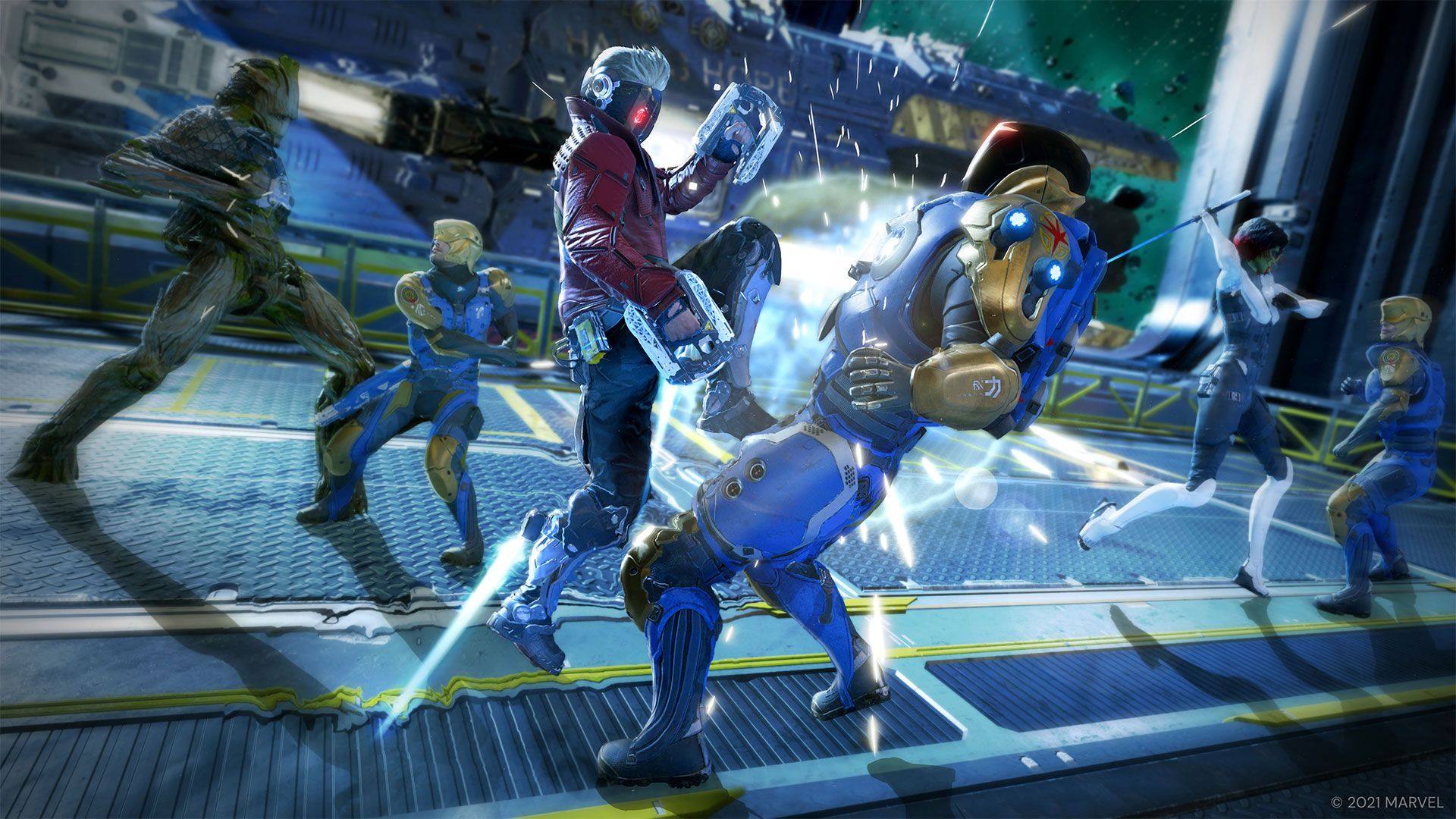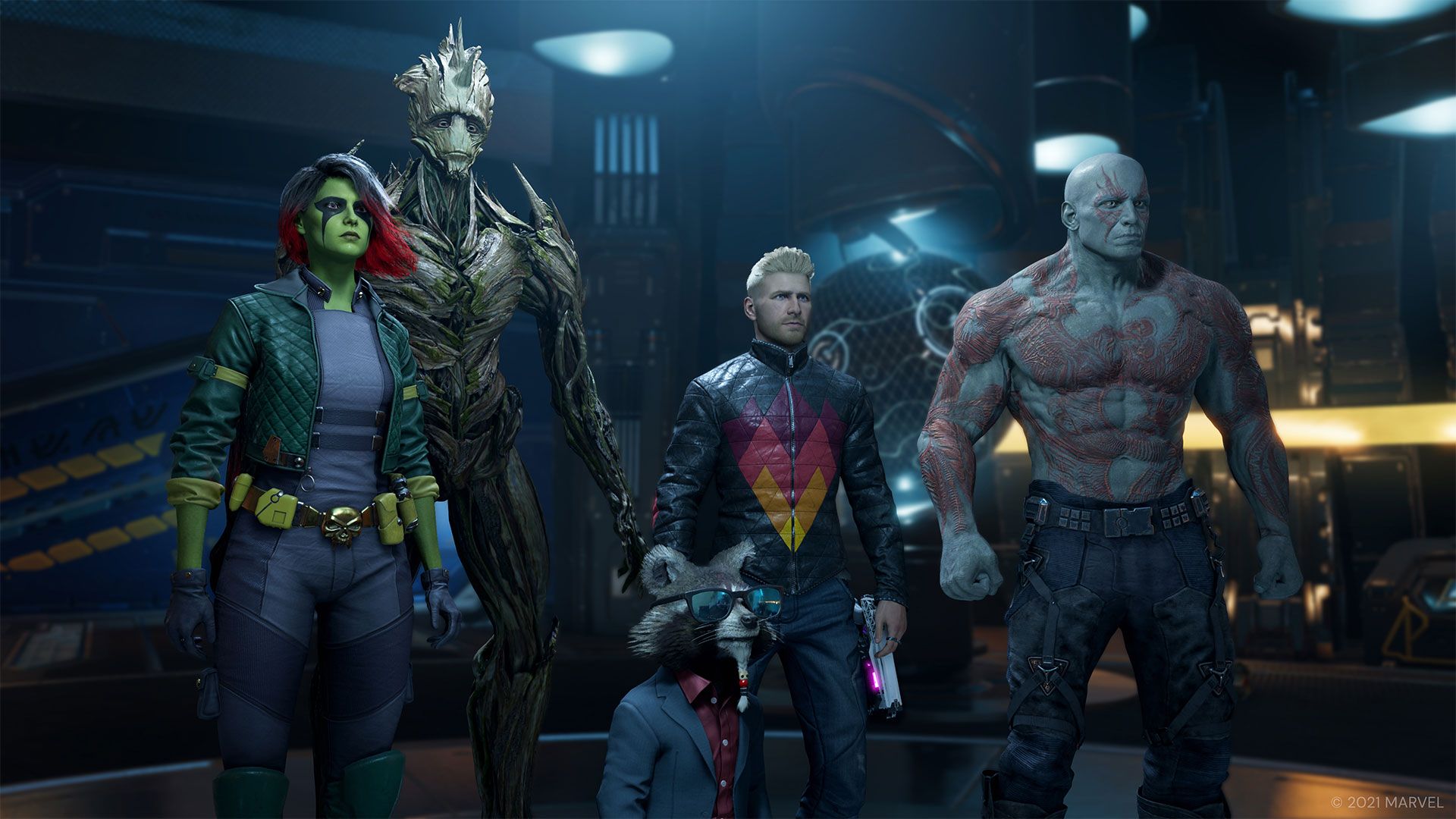The Guardians of the Galaxy are no stranger to video games. Following their TellTale Games adventure and prominent appearances in titles like Marvel Ultimate Alliance 3 and Marvel Future Revolution, the team is finally spinning off into their own action-adventure title this fall from Eidos-Montréal. From the beginning of its marketing, Guardians of the Galaxy has squarely put its focus not on bombastic action or eccentric gameplay mechanics, but on presenting itself as a raucous adventure where players get to hang out with the Guardians.
With the GOTG game's release date fast approaching and its official Twitter announcing the game's Gold status, CBR sat down with Senior Gameplay Director Patrick Fortier and Senior Narrative Director Mary DeMarle following a hands-on session with the game. Patrick and Mary discussed the game's adventure elements, teased the terrifying Universal Church of Truth, and shared what went into the engaging team-oriented combat system.
CBR: The exploration segments we saw on the Nova Corps Base felt like a modern take on classic adventure games such as King's Quest or Quest for Glory. What led to the team putting such a strong focus on exploration?
Patrick Fortier, Senior Gameplay Director: We wanted to create a homogenous experience of being with the Guardians. We didn't make the game on a set template. We didn't just say, "Okay, it's a superhero game, we need to play every character, check the box -- combat, traversal, okay, check the box." We wanted to create something organic.
Right from the start, it became clear these characters were going to shine. What's different about Guardians of the Galaxy is that they have strong personalities that conflict and need a vehicle for the ever-evolving relationship between them. We need some of that time for exploring or puzzle-solving...well, I say puzzles, but they're not big puzzles; they require the team, and they create paced moments. It wasn't about focusing on any particular mechanic; it was about making this handcrafted experience that would spotlight being with the Guardians, talking with the Guardians, seeing how they behave in certain situations. For instance, there's one room where Drax is fascinated with a soda machine. Moments like that are important to us in bringing these characters to life. That's where the experience would stand out compared to other games.
Mary DeMarle, Senior Narrative Director: Early on, the decision was that we wanted to hang out with these guys. When we're hanging out with them, that means going on an adventure. You're exploring locations, but you would be alone in other games, or maybe you'd have one companion. In Guardians, there are five people who are always together. Once we realized that, it led to all of our decisions on exploration and creating a locobanter system where they could be talking to you and you could be interjecting on the fly.
Fortier: Locobanter, for us, is locomotion and banter. It wasn't enough that they were just talking. We wanted performance as well. It's essential that they look at one another, look at the environment, and look aware of where they are in the world.
DeMarle: It became a big part and understanding that exploration is a huge part of this game. It advances both the story and characterizations, and it'll allow you to be doing what you normally do when you explore.
Were there any other games or franchises you looked to when conceiving those exploration segments?
Fortier: We try to take some of what we've developed. We're the same team that worked on Deus Ex, so you already know we like the idea of strong worldbuilding and show-don't-tell gameplay where just by looking at an environment, you can tell it looks lived in, which tells a story on its own.
For our game, on the social pillar -- not social in the sense of multiplayer, but social like within the team -- Star-Lord is a great orator. He's a silver-tongued devil: that's how he gets out of trouble, which plays a big role. There are moments we call the Battle of Wits, which is an offshoot of the debate system in Deus Ex. In the Battle of Wits, you don't know what you're thrown into. You have to figure out how to tell this person what they want to hear, and Star-Lord always tries to wiggle his way out of it. Then there are interactions that you have where you're moving and you can interject into the conversations with the Guardians without stopping or interrupting your own flow; that aspect was very important for us. There wasn't one pillar that was more important than the rest. It was all on relatively equal footing, and that's how we're creating a homogenous experience.
The interactions between the team really hearken back to some of the older incarnations of the Guardians with how they speak to each other; not really mean, but brutally honest and without a filter. Why go with that over the more recent, familial takes from the comics?
DeMarle: Well, if you go back and watch the first movie, they're pretty brutally honest with each other. Drax tries to kill Gamora in the first one. We're building a story in which they've been together a little while, so they know each other, but they haven't really fully gelled yet. Part of the decision was because this way, we can show character arcs and relationships changing throughout the game. They grow through the interactions and through everything that's happening. You'll notice that, as they start to gel as a team, they grow to respect the fact that they're brutally honest with each other. They come to know who each person is, and then they're able to see each other through that lens of understanding as they spend more time together.
One of the things that we were also kind of saying is that the strength and the humor of these Guardians come from them being brutally true to who they are as characters. Rocket is just Rocket regardless of the situation: he's going to tell you how it is. Drax is also very literal, so he's going to be blunt too. Peter, being the silver-tongued guy that he is, has to negotiate that as well.
From the early trailers, many were expecting the combat to be very close to the character-action genre (such as Devil May Cry), but in playing it, it's more of a light RPG experience; there's a lot of run-and-gun gameplay, but also a lot of managing abilities. What can you tell us about designing the combat system for Guardians of the Galaxy?
Fortier: I can tell you it was tough. [Laughs] That was the very first mechanic we started working on. A lot of people on the team wanted to develop Peter right away -- give him more gadgets and more power, things like that. I really wanted to figure out the Guardians, though. We went through a lot of iterations. For example, we tried controlling Peter in real-time, but that wasn't great: you'd ask for help from a given character, but Drax gets there and Peter's already down. It's like you're muddying up the battlefield all the time and figuring out the different metrics required for these other characters. Ultimately, that's where we found our groove. We simplified everything by unifying it to one button to control the Guardians. As a result, it's an empowering button. It slows time, so now you can analyze the battlefield a little bit. All the buttons that you get remind you which Guardian is where and, as you trigger them, you get an immediate effect.
Part of the difficulty was also figuring out exactly which specialty we would give to which Guardian. Theoretically, Groot could be an absolute tank and do everything by himself, but you want characters to have specialties so you can create strategies for encounters. There was a lot of balancing to create an environment where you don't feel like they're doing everything and you're just standing back or, in contrast, where you feel like you're doing all the work and they're just slowing you down. It was like trying to find that sweet spot where they'll come in and do a lot of actions by themselves, but you can still call on them at any time for strategic reasons. It creates these moments where you feel like you're operating as a team instead of individual characters doing their thing, which was important to us.
For the hands-on portion we played, we saw the Guardian's first encounter with the Universal Church of Truth, which is being presented as a major threat in the game. Why use the Universal Church of Truth over other Guardians' enemies?
DeMarle: We were in early decision-making, trying to think about what we wanted the story to be about like, "What do we want to make people feel like part of this story?" We settled on the concept of coming out of this war 12 years ago and dealing with the repercussions of it. This led us down a path of thinking about who could be a danger in this society, etc. I can't even remember if it was one of the internal writers or Bill Rosemann [Vice President of Creative for Marvel Games] who threw the Universal Church of Truth out at us as a potential enemy. Once we started reading into those comics, it all naturally fell into place for us.
Fortier: There was a natural fit with the sense of what was lost in the war and having an antagonist that could represent that. We've all had this idea that you want to go home, but you can never go home again, right? This idea of, "Oh, it was better before, and if I could only bring it back." All the Guardians, individually, have lost important things in their own lives. It hits a lot of themes, and then there's this idea of the faith and energy on top of it that becomes pretty interesting and original.
We did get to see the Huddle mechanic at work, and it's incredible how it was contextual to the exact moment in the fight where you hit the button. Are there any uniquely situational huddles players should look out for?
Fortier: No, the system for huddles is not handcrafted to the chapters. There are a lot of conditions that adapt to what's going on in combat, like the music that's playing. The same song in a particular situation could be playing because you're losing and it doesn't motivate the team, or it could be the one that gets them riled up to rally against their foes. I've listened to a lot of them, and I still get a kick out of listening to how Star-Lord manages to cheer on the team. He's so into it, and he really believes in his speeches.
DeMarle: What I'm most proud of with the huddle is how we handle those songs. So many people on the team were saying their favorite songs were always going to be played for when the huddle failed, but we were able to build something into it where everybody's favorite songs, given the right conditions, can be a winning track. Maybe one time, your favorite song will be the losing song, but another time it's what gets the Guardians amped up to win the fight.
Fortier: Yeah! The result is always interesting when you're kicking ass while blasting Rick Astley's Never Gonna Give You Up.
Those interactions on the Milano, both before the mission and after while we were blasting away enemies in a huge setpiece to a rock soundtrack, were pretty incredible. Will every chapter have moments like that?
Fortier: There's a lot of moments in the Milano, yeah. There are a lot of different things going on in there. I don't know how much you were able to explore, but there are various objects and things you can interact with. Just like during the exploration in the regular level, sometimes you can come across specific objects that Peter will have different reactions to depending on which Guardians they speak with. Once you're back on the Milano, you can trigger some conversations and learn a lot more about the backstory of those characters. It makes it really fun to come across those things if you're into that narrative experience, and it brings a lot of life to the characters. There are all sorts of little jokes, too, like exploring the Milano's bathrooms.
This level was a pretty sizable mission with a lot of story going on. Is every level about the size of the Nova Corps base?
Fortier: Actually, this is one of the relatively small ones, but it's all very handcrafted, from the level design to the story. When we worked on Deus Ex, we tried to embrace the freedom that players can go their own way. Here, it's very much the opposite. It's controlled, but it's very handcrafted. From one chapter to the next, the beats and flow of the story and the situations they're thrown into are very different. It's never the same; sometimes, it's more focused on combat or puzzles or the social element, and I really like that. As a player, you never feel like you can start expecting things. You never know what you're going to be thrown into, and I think that that makes the game really rich.
We noticed a handful of costumes were unlocked in the build we played, and they all look incredible. However, we were very surprised to find Gamora's costume from the first Guardians of the Galaxy film. Are there any other MCU surprises or any favorite costumes of yours that fans should look out for?
Fortier: Oh, I like Peter's classic blue Guardians costume from the comics. I think it just looks great.
DeMarle: I don't know that I have a favorite. I actually really like the designs that we came up with for them. I've gotten so used to it that the first time I put on a costume, I had to change it back because it felt weird! But there are a lot of costumes in there. As far as the MCU, yeah, there are a few nods in there as well.
Fortier: Of course, the costumes are all free, unlockable content.
Developed by Eidos-Montréal and published by Square Enix, Guardians of the Galaxy releases Oct. 26 for PlayStation 4, PlayStation 5, Xbox One, Xbox Series X|S, Nintendo Switch, and PC.

